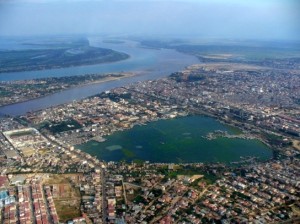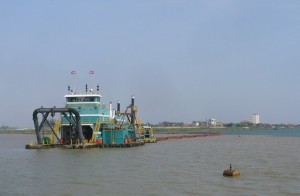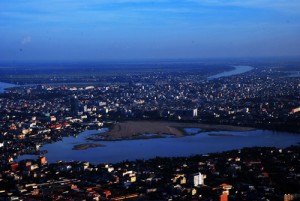The Mirror, Vol. 15, No. 707
The longstanding confrontations about the future solutions for the people who left or are under pressure to leave where about 4000 families used to live – most of them five or ten years or more – got again into the media. The Mirror had reported on related developments repeatedly – see for example The Lake is Going to Be Lost Forever – 13.11.2010. The following information is collected from a variety of sources. There are two main reasons why the problem is again in the media:
- On 2 March 2011, the local District Governor warned the almost 2000 remaining families that the authorities could not be held responsible if the people would not accept the compensation offers by the private company that holds the 99 years lease for the Boeng Kak area – 133 ha (including the lake and its surrounding land) by 9 March 2011 (on 7 March 2011, this deadline was withdrawn by verbal statements of city officials – but without any written confirmation, so the affected residents are left in limbo). A press release by the Phnom Penh City Hall on 21 December 2010 (admitting that there is still no final approved Master Plan) had explained: “The compensation policy takes 3 approaches for each house: 1st Option: Providing 8,000 USD and 2 Million Riels, 2nd Option: Providing a (4m x 12m) flat in Khan Dangkor [Note: far away] with 2 Million Riels and 3rd Option: On-site development—people are requested to temporary stay in a designated places prepared by the Capital Hall and wait for the construction work to be finished, using similar style buildings at Bory Keila. As a result, about 2,000 households have voluntarily accepted compensation policy of the Royal Government. However, for people, living in the surrounding areas outside Lake Surface, there will be discussions after the Master Plan of Shukaku Inc. Company gets approval from the Council for the Development of Cambodia (CDC).”
- On 8 March 2011, the board of directors of the World Bank admitted that mistakes had been made in the administration of a US$24.3 million grant to Cambodia’s Land Management and Administration Project [LMAP], which had been established and funded aimed at fighting poverty, by clarifying land rights and issuing about one million land titles, in the present situation after the lack of clarity left by the Khmer Rouge regime 1975/79 which had abolished all private ownership of land. – A statement from Robert Zoellik, the president of the World Bank, says: “We have repeatedly called on the government to end the evictions. We are seeking a positive government response.”
What is the procedural and legal background for the present conflict and human tragedy, and how is it working out? The problem is that there are different, contradicting, interpretations.
- 2001 – The Land Law says that people who can prove that they lived on the same plot of land have the right to apply for a land title.
- 2002 – The Land Management and Administration Project was created to handle such claims.
- 2002 – The government and the World Bank signed an agreement saying that people living on state land are protected from eviction unless fair compensation has been agreed.
- 2003 – The government “authorized Shukaku Inc. company to develop this area to be a commercial, cultural, tourism, housing, and resort hub, along with infrastructure development such as roads, drainage system, green space and amusement parks deserving to be a Pearl City as it has been known before.”
- 2007 – Phnom Penh City granted a 99 years lease to the private company “Shukaku Inc.” – but the identity of the company was not known to the public. Because there were several construction ventures proceeding with South Korean background, concerned residents of the lake area demonstrated in front of the Korean Embassy – but they were told that they are at the wrong place. Later it was disclosed that Shukaku is owned by the Senator Lao Meng Khin of the Cambodian People’s Party.
- 2008 – National Assembly President Heng Samrin is reported in a Khmer newspaper to have signed an appeal to stop pumping soil from the Mekong River to fill the Boeung Kak lake.
- 2010 – The Expropriation Law is understood to say clearly that legal possessors have the same right to market price compensation than title holders.
- 2010 (8 September) After representatives of the Chinese Inner Mongolia Erdos Hung Jun Investment Company had met with the Prime Minister, it was said that they have contracts with two Cambodian companies – it was later understood that one is Shukaku. But this information became only wider known more recently. (See The Mirror: All Equal Under the Law? – 9.1.2011)
- 2010 – (29 December) When ninety-nine monks, were invited by lake side residents, to represent the 99 years of the lease, the authorities prevented them from holding a religious blessing ceremony at the lake side.
- 2011 – (31 January) Governor Kep Chuktema attended a ground breaking event for a bridge construction including the religious Krong Pali ceremony, which requests the permission from the spirits of the land for the construction to begin.
All these developments have – apart from their human and legal side – also an economic background which is not often analyzed in detail.
A press release by Phnom Penh City Hall in December 2010 had warned the desperately demonstrating affected residents not to follow “a handful of opportunists” but to chose “among the three options in order to facilitate the next step development process to be more successfully complying with the development policies of the Royal Government.”
What these development policies for the Boeng Kak region are has been spelled out in more detail in an interview with the Phnom Penh Governor by Channel NewsAsia from Singapore on 27 January 2011, describing that “Phnom Penh is the Capital of peace, security and social orders and its people are living harmoniously with good living standard.” The following selected sections relate to the present subject:
“Land policy for Phnom Penh development has also been an important subject in the interview which targets the development by turning anarchical areas into commercial and industrial zones.
“H.E Governor described step by step progress from the deliberation day 7th January [Note: The liberation day from the Khmer Rouge regime, on 7 January 1979] until gaining full peace through win-win policy of Samdech Techo [Prime Minister Hun Sen], Head of the Government, and rapid progress of double digits economic advancement leading to unavoidable population bust and self-development. Therefore, Phnom Penh Capital Hall has prepared Development Master Plan for 2020, dividing into residential, commercial, industrial, agricultural and green space areas…
“In response to questions concerning compensation to land owners affected by development projects, H.E Governor stressed that there are two types of development taking public and private investment approach.
“Development basing on public investment related to the construction of roads, bridges and other public infrastructures which unavoidably impact land owners, and we have to pay compensation in accordance with Cambodia’s new land tax law and market price. But in case people illegally occupied state land, we put our decisions on circulation No.03 on temporary buildings on state land in which we will use charitable policy but not a compensation.
“Whereas development basing on private companies, it comes to buying-selling between private companies and land owners which affect development projects under free market price. Therefore, compensation can be appropriately justified. Although a handful of people disagree with free market compensation policy, majorities view it as reasonable and acceptable because Phnom Penh Capital Hall executes development projects envisaging long future, that is to say long-term visions for majorities as in other democratic countries…”
David Pred, the Executive Director of Bridges Across Cambodia – “We envision a just society in which human rights are respected, protected and fulfilled for everybody equally, and where people live in harmony with our environment” – has analyzed the implications of the granting of a 99 year lease – there is no information available that this was done in a process of public bidding – to Shukaku, under the heading Inclusive Development Is Still Possible in Cambodia. The following sections mirror mainly his analysis of the financial gains and losses involved.
In an interview that aired last week on Channel News Asia, Phnom Penh governor Kep Chuktema said it was inevitable that some people would suffer because of development but that this should not deter authorities from developing the city. The rest of world, he said, is moving on and Phnom Penh cannot lag behind. Many people hold this utilitarian view of development – that is, until they themselves become the ones who are harmed.
The test of whether the governor’s logic holds up to the principles of justice is simple: Is he prepared to give up his land and home for a small fraction of the market price in order to develop Phnom Penh? That is, after all, what he is demanding of urban poor and middle class homeowners who have the misfortune of being situated in the path of progress and development…
It is instructive to apply Mr. Chuktema’s explanation to the current land dispute between City Hall, private developer Shukaku Erdos Hung Jun Property Development and families living around Boeung Kak lake.
This project appears to entail a combination of public and private developments. A private company has been granted a 99-year lease over the 129-hectare area and has been granted the right to develop it for private profit.
The city and the developer have set monetary compensation policy at $8,500 per household, regardless of the size or type of house or whether they are living on the lake, which is state public property, or the land around the lake, which is legally possessed by the lakeside residents…
Eviction and demolition orders have also been given to homeowners living outside of the leased area to make way for public access roads into the development zone. In most cases, these households, like those living on the land in the lease area, are legal possessors who were unlawfully excluded from the systematic land registration process that took place in the area in 2006 to 2007.
Nevertheless, the 2010 Expropriation Law is clear that legal possessors have the same right to market-based compensation as titled owners. Despite these guarantees, the cash compensation being offered to Boeung Kak families is a tiny fraction of what their homes are worth…
I have met families who paid up to $200,000 for their property and were forced to accept $8,500 as compensation as they watched their homes disappear under a deluge of mud from Shukaku’s sand pumping machine.
A market survey of the land values of privately held plots around the lake suggests property prices before development range from $1,500 to $3,000 per square meter. This is interesting since Shukaku paid a mere $79 million for that land and the 90-hectare lake that is now being filled.
Altogether, once the lake is filled, the entire lease area will be worth a minimum of $1.941 billion. Shukaku was thus awarded the property at about 4 percent of its market value, while the residents, who are being compensated out of the $79 million rental fee, are forced to accept between 5 and 10 percent of their property values in compensation.
If compensation was paid to the legal possessors based on the lowest range of the market price, the developer should be paying out at least $450 million to the residents just for their land. Yet, the compensation payments amount to little more than $36 million in total for both land and structures.
You may have gotten lost in the math but the bottom line of this equation is the theft of about a half billion dollars in private property…
So there is the assertion, on the one side, that – according to the Land Law – those people living around the lake for more than five years, have a claim on receiving land titles for land worth all together over US$500 million. On the other hand Phnom Penh Deputy Governor Pa Socheatvong rejected this whole concept: “How can they have the right to request land titles when they stole the land? They stole the land, and we take it back without punishing them.”
But there is the Land Law, and the Land Management and Administration Project supported by the World Bank.
When the residents around the lake became eligible to file applications for titles in 2006, the administrators of this project refused to accept their papers – indicating that this would happen later, because their area was contested land. But the Phnom Penh City, instead, contracted the lake and the surrounding area to Shukaku – only one year later, in 2007.
When the World Bank reminded the government of the original intention of the Land Management and Administration Project – to stabilize and pacify a situation inherited from Khmer Rouge times, to provide land titles to those who live on the land – the government canceled the agreement for the support of the Land Management and Administration Project with the World Bank.
Norbert KLEIN
Have a look at the last editorial – you can access it directly from the main page of the Mirror.
And please recommend The Mirror also to your colleagues and friends.




Recent Comments